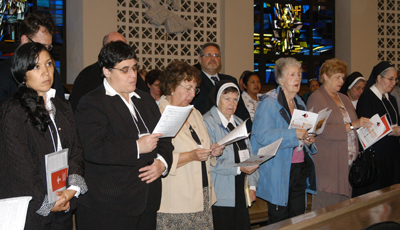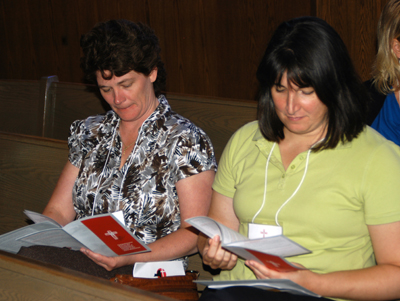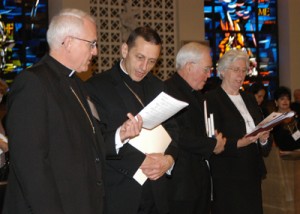by Marie Elena Giossi
Training catechists to meet the complex challenges of an evolving catechetical ministry was the focus of a daylong conference at the Immaculate Conception Center, Douglaston, on Thursday, Sept. 27.

New York State’s bishops, along with the state Council of Diocesan Directors of Religious Education, gathered to formally launch and discuss their new document, The Catechetical Leader in the Third Millennium, which is aimed at improving catechesis and raising standards for catechetical leadership statewide.
“We’re charged with passing on the faith to children and young people,” said Sister Ellen Rose Coughlin, S.S.J., superintendent of schools, Diocese of Ogdensburg, one of the event speakers. “The bishops recognize how important it is that we have competent, qualified leaders.”
Catechetical leaders, she said, should not have “simply book knowledge, but knowledge of being a disciple in its fullest dimensions,” with the ability to grasp the “full beauty, truth and integrity” of Catholic doctrine and tradition. Cardinal Timothy Dolan was the principal celebrant of a concelebrated Mass which opened the event just before 11 a.m. Following Mass and lunch, the bishops’ statement was distributed to the catechists, catechetical leaders, priests and bishops present.
Afternoon sessions covering its content, impact on the new evangelization and implementation were presented by Bishop Terry R. LaValley of Ogdensburg and Brooklyn Auxiliary Bishop Frank J. Caggiano, who collaborated with diocesan directors of religious education in writing the statement; Bishop Richard J. Malone of Buffalo; and Sister Ellen Rose, respectively.
Almost 500 representatives from all eight New York dioceses attended the event, which was also streamed live over the Internet by DeSales Media Group for remote viewing across the state.
The statement, approved by the state’s bishops in November, 2011, identifies five areas in which catechetical leaders require proficiency, namely, evangelization, the changing parish landscape, the family, cultural realities and technology.
Addressing these five areas, Bishop LaValley noted that the statement serves as a complement to the New York bishops’ earlier document, The Catechist in the Third Millennium, and builds upon the USCCB’s National Certification Standards for Lay Ecclesial Ministers, which lays out criteria for competent catechetical leadership. 
“Today we need a new and transformative approach to catechesis,” said Bishop LaValley. “We must set the trends, not just follow them.”
He noted that the five areas are “all facets of the world in which we live that demand special attention … by those who direct our parish catechetical efforts.”
Unlike years ago when clergy and religious were responsible for parish catechetical efforts, today’s programs are run by lay volunteers, many of whom do not have the same knowledge of faith and ability to articulate it as their predecessors did.
Bishop Caggiano said that the bishops’ document presents lay catechists and catechetical leaders with “a timely challenge” to gain the skills they need to become more competent catechists, to deepen their relationship with the Lord and lead others to a greater appreciation of the faith.
Living Vestibules
“This document is an invitation to us to remember one basic fact – you and I are living vestibules of the house of the Lord,” Bishop Caggiano said.
“Your ministry and mine as catechists is to lead everyone to have an encounter with the remarkable, transformative person who is none other than God made man.”
However, the bishop told attendees that they “cannot share He who we do not know. … If you and I are not deepening our own relationship with our Lord, this document will make no difference.”
The bishops also released a companion document, The Comprehensive Plan for the Formation of Catechetical Leaders in the Third Millennium. This expands on the bishops’ statement and provides a comprehensive plan to realize and sustain the vision presented in the statement.
Beth Rivalsi, religious education director at Our Lady of the Snow, Blue Point, L.I., said she thought the statement was timely and was particularly interested in the bishops’ consideration of the family.
“We need parents to realize they are the ones who form the faith of their children and we are there to support them,” Rivalsi said. She appreciated that the bishops are “thinking out of the box and using new techniques to meet the needs” of today’s catechists.

Amid this changing world, Bishop Malone reminded catechists that the “primary focus and locus for the new evangelization is the parish community,” which is called to be “an intentional community of disciples who are actively engaged.”
That community, he noted, must pay attention to cultural realities, honor diversity, dialogue on secular issues, encourage members to share their time and talents and most importantly, be rooted in the Eucharist, if it wishes to have rich soil to nurture the seeds of faith and vocations.
Looking over the statement, Lori Dahlhoff, executive director of the religious education department for the National Catholic Educational Association (NCEA), said she was impressed by “the care and commitment to catechists of all ages and settings across the board.”
“Just as Christ took His ministry to the people, we’ve got to go to the people,” shared Mark Trudeau, youth minister at St. Ambrose, Latham, N.Y. “When we do, we better know what to say.”
Trudeau thought the conference was “fantastic.” He looked forward to further reviewing the materials he received, but he already had a good grasp on the essence of the bishops’ message.
“Like St. Paul, we have to be all things to all people,” he said.
